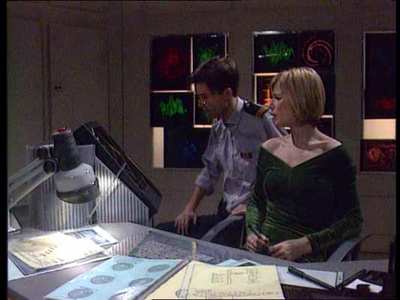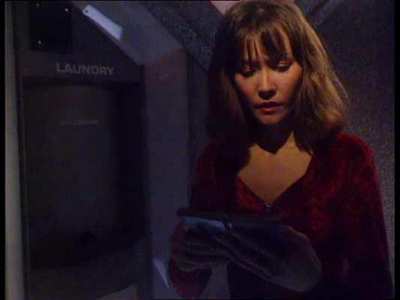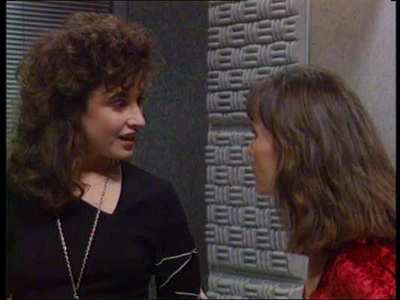Review of Jupiter Moon Volume 1: Episodes 1 To 11 (Two Discs)
Introduction
When I first heard of Jupiter Moon, I was intrigued. To hear of a space based sci-fi series from the early nineties that I had no recollection of was odd, to put it mildly. That the series was a British production was astounding. It was a mystery that was resolved as soon as I put the disc into the player, and was confronted by a logo for BSB at the end credits. That`s BSB as in British Satellite Broadcasting, as in the squarial. That`s an invention that`s consigned to the White Elephant department of history, along with the Sinclair C5 and the APT tilting train. This is Volume 1 with 11 episodes of Jupiter Moon presented on two discs, although I received only the first with six episodes, something that I grew to be profoundly grateful for.
The I.L.E.A is a space station orbiting one of Jupiter`s moons, housing Columbus University. (Not to be confused with the defunct Inner London Education Authority) These 25-minute episodes follow the lives of the staff and the students, as well as the occasional visitors and the two-man command crew. It`s the year 2050 and mankind is poised to launch a mission to explore a star. This means little to anyone at the college, except one of the lecturers who`s been asked to go, but is in two minds, and one of the command staff, who is desperate to go, but has been repeatedly refused. Meanwhile, as the space station continues on its orbit, we are treated to the travails and love lives of the students as the New Year passes. What is that on the scanner though? As Red Dwarf`s Cat would eloquently put it, "Danger! Swirly thing alert!"

Video
The 4:3 regular picture no doubt reflects the original ratio of the programme. The transfer itself is unremarkable. What artefacts there may be, or softness of image pales in the light of the woeful production values. This programme was made in 1990, but the effects predate that by at least 25 years. The spacecraft models come from the Blue Peter school of model making, all Fairy liquid bottles and egg cartons painted in gold and silver. The show itself is wholly studio bound, and quite obviously so, with a few pieces of oddly formed plastic and flashing lights doing little to hide the garden shed budget of the show.

Audio
The sound is a simple DD 2.0 track, the dialogue such as it is, is clear throughout, and the Godawful theme tune reminded me of the old Triangle show from the BBC once upon a time. There are no subtitles to this programme.

Features
Disc 1 had no extras at all, although I must admit that the animated menus were far more impressive than any of the effects in the show. There are apparently extras on Disc 2, though my marks obviously reflect what I saw of Disc 1.

Conclusion
Good grief! I found a couple of websites dedicated to Jupiter Moon and was amazed to find that £6 million pounds had been invested in a year`s worth of programming. This was obviously BSB`s flagship programme, and by the end of the first year 150 episodes had been made. That`s something to bear in mind if you are considering investing in the first 11. Shown three times weekly on Galaxy, and with considerable input from institutions like British Aerospace and the University of Birmingham, it was touted as "science possibility rather than science fantasy". However, the merger of BSB with Sky left the last 40 episodes on the shelf, and Galaxy made way for Sky One. It wasn`t until 1996 that the final episodes were aired on Sci-fi. I just hope that it never makes its way to terrestrial.
A television show with absolutely no redeeming features, that`s quite an achievement. I was quite unprepared for just how dismal this programme would be, and I watched it with the horrific fascination that is usually reserved for a train wreck. A low budget isn`t necessarily the end of the world, and just because your special effects consist of a glorified detergent bottle on a string, doesn`t mean that you are limited in terms of storytelling, just look at the first two series of Red Dwarf, but Jupiter Moon is a triumph of bad scripting, bad acting, woeful dialogue, and a tuppence worth of dodgy science, despite the professional input. It was a show doomed from conception, when some smart aleck must have said, "I know, let`s make a Soap Opera, but in space." The result isn`t even Crossroads, it`s a refugee from the El Dorado school of acting. Twenty-something girls with the last vestiges of eighties hair, pine away incessantly after space warriors and boyfriends, a precocious teen spends his time hacking his way into chocolate vending machines and being ignored, and the vaguely mature characters spend their time pursuing loosely sci-fi storylines, which have had a total of ten seconds of research done on them by the writers. I can only hope that it improved over the following 144 episodes, as the first six were perhaps the worst experience I`ve had in front of a television in months.
The one recurring thread of an alien menace is introduced in these first six episodes by virtue of perhaps the most gormless character yet seen on British television. He spots a saucepan of boiling tar, or percolating coffee on one of the scanners, and in the best tradition of sci-fi no-one believes him until it`s too late. If you spout dialogue like that, no one would take you seriously either. I`ve given this a couple of marks for the unintentional humour. Should you watch this, you too will be laughing in disbelief. But don`t watch this, run, run like the wind, get away before it`s too late.
Your Opinions and Comments
Be the first to post a comment!